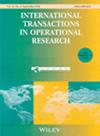具有混合设施的多目标可持续闭环供应链网络问题
IF 3.1
4区 管理学
Q2 MANAGEMENT
引用次数: 0
摘要
可持续发展的闭环供应链网络要求在供应链中结合实施逆向物流,并在决策时考虑经济、环境和社会因素。在现实生活中,需要通过确定目标的优先次序或目标之间的相互作用来解决问题,从而为决策者提供一系列解决方案。在此背景下,本研究提出了一个新颖的多目标可持续闭环供应链网络问题,该问题基于混合回收中心的修正网络设计模型,最小化(1)总经济成本,(2)所用车辆的二氧化碳排放量,以及(3)总厌恶距离。后一个目标是对可持续模式的社会维度的新颖实现。通过方差分析对多目标模型进行了敏感性分析。为了测试模型和求解方法,我们生成了一个实例数据集,并配置了 AUGMECON2 和 AUGMECON2-EXTENDED,其中 AUGMECON2 是一种线性规划松弛方法,用于改善 CPU 时间,而 AUGMECON2-EXTENDED 则用于获取更多的解,以避免探索所有解的空间。结果表明,AUGMECON2-EXTENDED 实现优于所有选定的性能指标。这些性能指标包括 NPS、CPU 时间、RPOS、QM 和 HV。结果表明,与其他实现相比,AUGMECON2-EXTENDED 在这些指标上的平均改进至少分别为 、 、 和 。本文章由计算机程序翻译,如有差异,请以英文原文为准。
A multi‐objective sustainable closed‐loop supply chain network problem with hybrid facilities
A sustainable closed‐loop supply chain network requires conjunctive implementation of reverse logistics in the supply chain, with decisions that consider economic, environmental, and social factors. In real life, the problem needs to be addressed by prioritizing targets or interacting between them to give a range of solutions to the decision maker. In this context, this work proposes a novel multi‐objective sustainable closed‐loop supply chain network problem based on the revised network design model with hybrid recovery centers minimizing (1) the total economic cost, (2) the CO2 emission of vehicles used, and (3) the total obnoxious distance. The latter objective is a novel implementation of the social dimension of a sustainable model. A sensitivity analysis of the multi‐objective model is developed through ANOVA. A dataset of instances was generated to test the model and the solution methods, which are configured with AUGMECON2, a linear programming relaxation implemented to improve the CPU time, and AUGMECON2‐EXTENDED to obtain more solutions to avoid exploring all space of the solution. The results show that an AUGMECON2‐EXTENDED implementation outperforms all the selected performance metrics. These performance metrics include NPS, CPU time, RPOS, QM, and HV. The results show an improvement on average of at least , , , , and , respectively, in those metrics, in comparison to other implementations.
求助全文
通过发布文献求助,成功后即可免费获取论文全文。
去求助
来源期刊

International Transactions in Operational Research
OPERATIONS RESEARCH & MANAGEMENT SCIENCE-
CiteScore
7.80
自引率
12.90%
发文量
146
审稿时长
>12 weeks
期刊介绍:
International Transactions in Operational Research (ITOR) aims to advance the understanding and practice of Operational Research (OR) and Management Science internationally. Its scope includes:
International problems, such as those of fisheries management, environmental issues, and global competitiveness
International work done by major OR figures
Studies of worldwide interest from nations with emerging OR communities
National or regional OR work which has the potential for application in other nations
Technical developments of international interest
Specific organizational examples that can be applied in other countries
National and international presentations of transnational interest
Broadly relevant professional issues, such as those of ethics and practice
Applications relevant to global industries, such as operations management, manufacturing, and logistics.
 求助内容:
求助内容: 应助结果提醒方式:
应助结果提醒方式:


